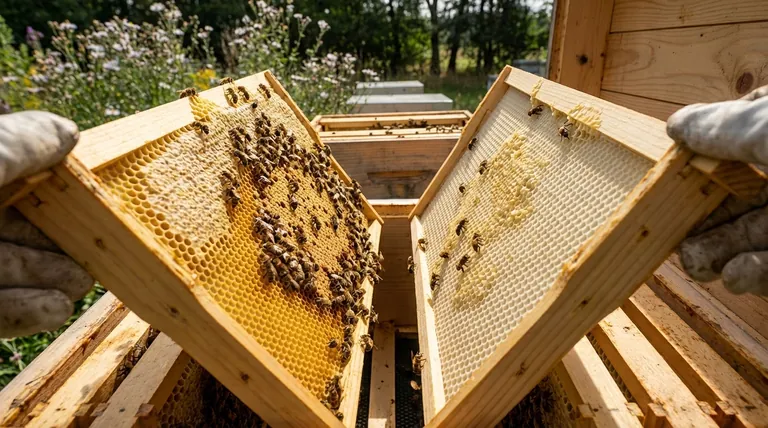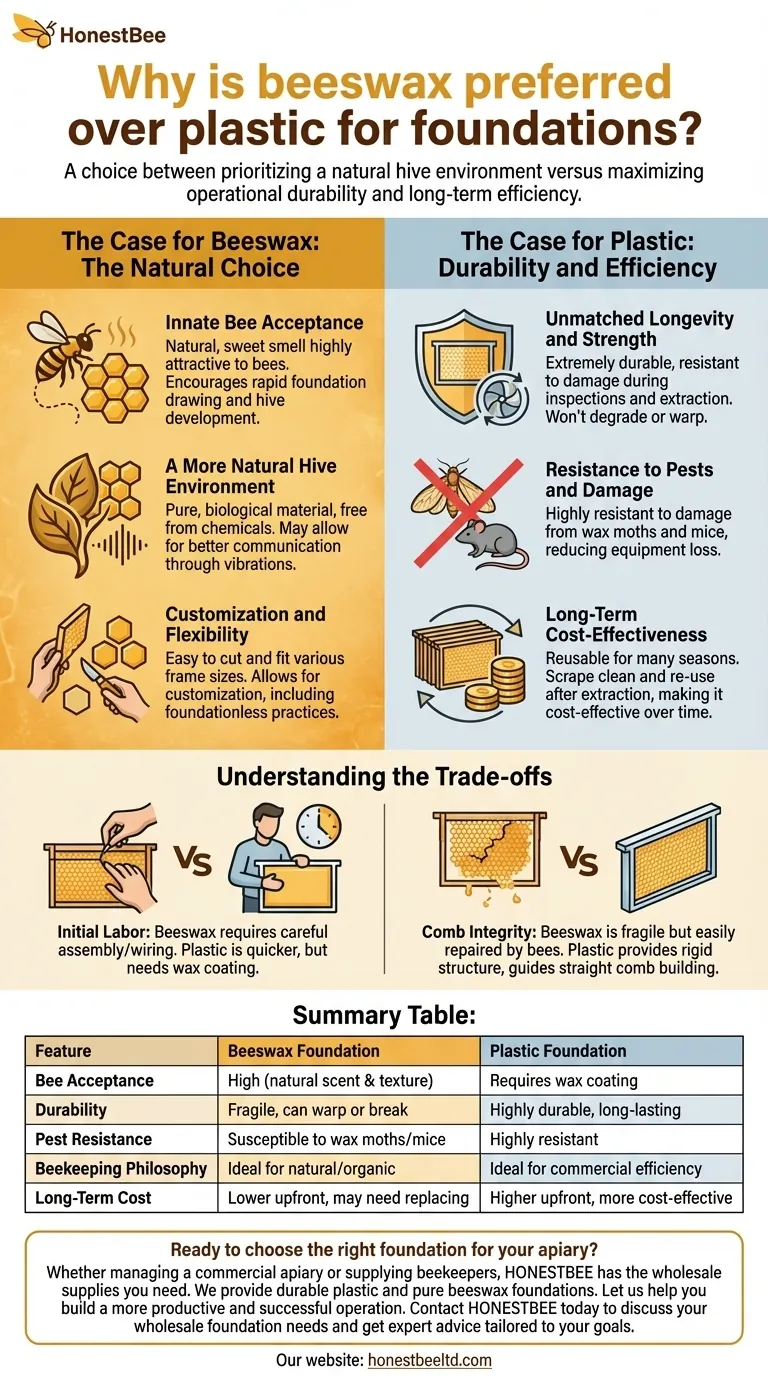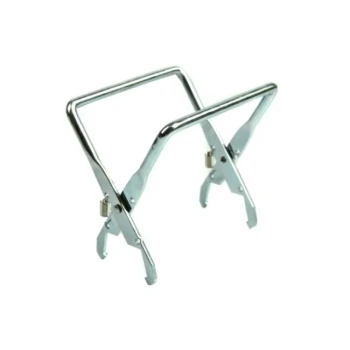At its core, the preference for beeswax foundation stems from its natural composition. Beekeepers often choose beeswax because it is a material bees produce themselves, offering a familiar scent and texture that encourages rapid and enthusiastic acceptance by the colony for building comb.
The choice between beeswax and plastic foundation is not about which is universally "better," but about aligning your equipment with your beekeeping philosophy—prioritizing a natural hive environment versus maximizing operational durability and long-term efficiency.

The Case for Beeswax: The Natural Choice
Beeswax foundation appeals to beekeepers who want to create a hive environment that most closely mimics how bees operate in the wild. Its properties are inherently familiar to the colony.
Innate Bee Acceptance
Beeswax has a natural, sweet smell that is highly attractive to bees. This familiar scent encourages them to quickly "draw out" the foundation, building the hexagonal cells needed for raising brood and storing honey.
Many beekeepers observe that colonies take to pure beeswax faster than they do to plastic, accelerating the hive's development.
A More Natural Hive Environment
For those practicing natural or organic beekeeping, beeswax is the only choice. It is a pure, biological material free from the potential chemical additives that might be present in some plastics.
Beeswax is also thought to allow for better communication within the hive through vibrations, a subtle but important aspect of colony cohesion that a rigid plastic sheet may dampen.
Customization and Flexibility
Beeswax foundation is easy to cut and fit into various frame sizes. It also allows for customization with different cell sizes, which is a key factor for beekeepers experimenting with foundationless or small-cell beekeeping practices.
The Case for Plastic: Durability and Efficiency
Plastic foundation is chosen for its strength, longevity, and ease of use, making it a pragmatic choice for many beekeepers, especially those managing many hives.
Unmatched Longevity and Strength
Plastic is extremely durable and far less likely to be damaged during hive inspections or honey extraction. A major benefit is its resistance to blowouts in the extractor, where the force of spinning can destroy fragile wax comb.
Unlike beeswax, plastic foundation will not degrade over time or warp in high temperatures, and it can be stored easily.
Resistance to Pests and Damage
Plastic foundation is highly resistant to damage from pests like wax moths and mice, which can devastate traditional beeswax combs, especially during storage.
This resilience reduces equipment loss and the associated replacement costs.
Long-Term Cost-Effectiveness
While the initial cost might be comparable, plastic foundation is reusable for many seasons. After honey is extracted, it can be scraped clean and placed back in the hive, making it a more cost-effective option over the long run.
Understanding the Trade-offs
Neither foundation type is perfect. The choice involves balancing the instincts of the bees with the operational needs of the beekeeper.
Initial Labor and Preparation
Beeswax foundation often requires more careful handling and assembly, sometimes involving wiring frames to provide support.
Plastic foundation, especially when sold as a single-piece frame and foundation unit, significantly reduces assembly time. However, it typically requires a coating of beeswax to encourage the bees to accept it.
Comb Integrity vs. Flexibility
Pure beeswax comb is more fragile but can be easily repaired by the bees.
Plastic provides a rigid structure that guides bees to build straight comb, but if bees are reluctant to build on it, you are left with an unusable frame.
Making the Right Choice for Your Apiary
Your goals as a beekeeper should dictate your choice of foundation.
- If your primary focus is natural beekeeping: Choose beeswax foundation to provide your colony with the most natural and readily accepted building material.
- If your primary focus is operational efficiency and durability: Choose plastic foundation for its longevity, strength during extraction, and pest resistance.
- If you want a balance of both: Consider using plastic foundation that has been heavily coated with real beeswax to get the benefits of durability while encouraging bee acceptance.
Ultimately, understanding the distinct advantages of each material empowers you to build a hive that aligns with your specific management style and goals.
Summary Table:
| Feature | Beeswax Foundation | Plastic Foundation |
|---|---|---|
| Bee Acceptance | High (natural scent & texture) | Requires wax coating |
| Durability | Fragile, can warp or break | Highly durable, long-lasting |
| Pest Resistance | Susceptible to wax moths/mice | Highly resistant |
| Beekeeping Philosophy | Ideal for natural/organic | Ideal for commercial efficiency |
| Long-Term Cost | Lower upfront, may need replacing | Higher upfront, more cost-effective over time |
Ready to choose the right foundation for your apiary?
Whether you manage a commercial apiary or are a distributor supplying beekeepers, HONESTBEE has the wholesale supplies you need. We provide durable plastic foundations for maximum efficiency and pure beeswax foundations for natural beekeeping practices.
Let us help you build a more productive and successful operation.
Contact HONESTBEE today to discuss your wholesale foundation needs and get expert advice tailored to your goals.
Visual Guide

Related Products
- Manual Beeswax Comb Foundation Machine Wax Foundation Mill Embossing Machine
- Beeswax Foundation Sheets Beehive Foundation for Wholesale
- Colorful Silicone Beeswax Foundation Mold Mould for Beekeeping
- Professional Frame Preparation: The HONESTBEE Electric Wire Embedder
- Food Grade Plastic bee Foundation for Bee Frames
People Also Ask
- Why is the use of foundation sheets critical for efficient comb building in improved beehives? Maximize Hive Productivity
- Why is the regular replacement of wax foundations necessary? Prevent EFB/AFB & Ensure Hive Health
- How does the implementation of Comb Foundation influence colony development? Boost Your Honey Yield and Hive Efficiency
- What role do comb foundation sheets play in the initial establishment of a scientific bee colony? Master Hive Efficiency
- What are the industrial and artistic applications of beeswax? Discover the Versatility of Nature's Premium Binder
- Why is high-purity natural beeswax essential for foundations? Prevent Larval Mortality & Boost Colony Health
- Why is periodic beeswax foundation replacement recommended? Boost Hive Longevity with Sustainable Management
- How does high-quality wax foundation contribute to the production of natural comb honey? Boost Quality & Yield












